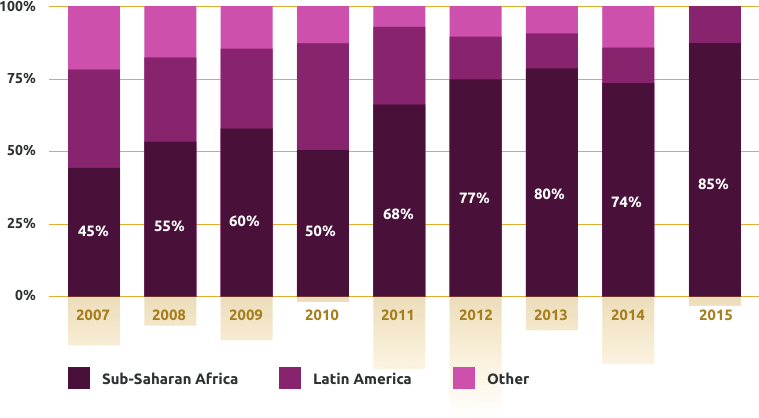Our Programs / Strategy / Where We Work
The JRS Biodiversity Foundation is uniquely focused upon biodiversity informatics capacity development in sub-Saharan Africa.
The JRS Biodiversity Foundation’s mission is to increase access to and use of information that will lead to greater biodiversity conservation and more sustainable development in sub-Saharan Africa. We are the only funder focused on increasing access to biodiversity data and on the information technology (IT) behind conservation decisions. With assets of $45M, we invest about $1.8M per year in six to ten, multi-year grants.
We invest in biodiversity data and information systems and in the capacity development of the people and organizations who share biodiversity data in Africa. Our Theory of Change is that supporting partnerships of knowledge providers and knowledge users to address critical challenges in conservation and sustainable development will enable better decision-making and expand access to biodiversity data and information services.
We concentrate resources to better select and support our grantees.
Effective grant-making requires knowing the people and institutions where we invest and understanding the challenges and opportunities that they face. Geographic limits to our grantmaking increase our ability to be relevant to national policies, understand institutions and capacity, relate to partners and other donors, build networks and capacity, and operate efficiently as a leader in our field.
We have analyzed geographic choices through the lens of available JRS funds, operational efficiency, stability and security, governance, size and location, biodiversity hotspots, location of our grant partners, other donors’ commitments, and conservation priorities. We screened countries for their biodiversity importance, vital freshwater river basins, emerging biodiversity informatics capacity, agricultural research capacity, large populations, significant donor investment, governance indicators of risk, and the ease of our operations.
Our Freshwater and Pollinator Biodiversity grantmaking focuses in seven countries within eastern and southern Africa.
We have chosen to make our Freshwater Biodiversity and Pollinator Biodiversity grants in two nodes of contiguous countries:
- East Africa: Kenya, Rwanda, Tanzania, and Uganda.
- Southern Africa: Botswana, Malawi, and South Africa.
Our Capacity Development investments are of regional scope.
JRS’ over-arching mission is one of capacity development of people and institutions who create access to and use biodiversity information and knowledge. All our grants include components of training, participation in networks, and sharing of materials and methods. We will make some Capacity Development investments such as in training programs in eastern, southern and western Africa, wherever such investments are likely to be sustained.
Grantmaking outside of our focus countries will be considered in exceptional circumstances.
The Foundation is beginning to build grant portfolios and to learn about investment opportunities in our Freshwater Biodiversity, Pollinator Biodiversity and Capacity Development Programs. Our strategy is dynamic and evolving. Our solicited grant proposals and our open requests for proposals may expand our geographic interest areas beyond the seven focus countries and applicants should refer to our latest funding requests. The potential of any project to closely complement other investments in our portfolio is an important factor in all grant-funding. Grant proposals that are closely aligned with our strategy and that hold potential for exceptional impact upon biodiversity informatics capacity development outside of our focal countries may be considered. The investment of other donors in biodiversity informatics may also influence opportunities for JRS. Should you have an exceptional idea that compellingly aligns with the JRS mission and strategy, but falls outside of our priority geography, we encourage you to discuss your concept with the Foundation before submission. Factors that influence our choice of the locations for our grantmaking include:
![]()
Environmental Factors
Environmental factors such as contiguous ecosystems, key biodiversity areas and threats to biodiversity.
![]()
Strategic Factors
Strategic factors such as major catchment basins, agricultural economy, size of protected areas, and levels of cyber infrastructure and scientific research.
![]()
Large Scale Impacts
Factors favoring large-scale impacts such as population size, geographic area, regional influence, size of economy, economic growth, security, and government effectiveness.
![]()
Partnerships
Factors that influence partnerships and sustainability such as flows of overseas development assistance, conservation investment, geographic priorities of donors, tourism value, and informatics partners.
![]()
Affordable Grant Outputs
Financial factors and the scale of affordable grant outputs such as number of experts per country, the cost of web portals and information systems, and the cost of travel.
Geographic Distribution of JRS Grant Awards
JRS has evolved our strategy over time from grantmaking in Latin America and sub-Saharan Africa to focusing exclusively on sub-Saharan Africa.

